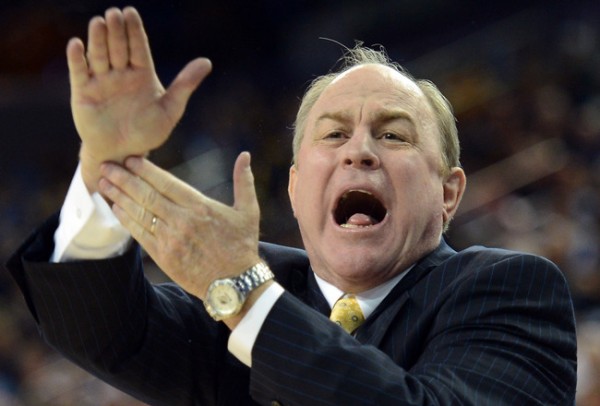Perception, Meet Reality: Ben Howland’s Usage of Timeouts Actually Works
Posted by AMurawa on February 19th, 2013The Ben Howland timeout. You know the reputation — they come at random times, more often stopping a UCLA run than bringing any benefit to his team, leaving the Bruins without any timeouts for the stretch run. I’ve said it myself plenty of times, but then in poking around the issue last week, I couldn’t find any good factual analysis interpreting Howland’s timeout pattern and the results. So, I did it myself. And here are the facts, based only on this season, with details to follow: Ben Howland makes pretty darn good use of his timeouts.
Before we get into the hard numbers, here’s the method to my madness. I only looked at timeouts called by UCLA prior to the four-minute mark in the second half and I excluded any timeout in the final minute of the first half as well, figuring those timeouts are almost universally accepted as a “normal” usage of timeouts. Using that group of timeouts (there have been 77 this season over 26 games), I looked at a few things: the total score for each team’s possession following that timeout; the total run prior to the timeout; and, the total run after the timeout. Defining a run is a bit more perilous, but I limited it to consecutive possessions with points scored by one team, while allowing for one possession without a score provided that team’s opponent does not score. In other words, if both teams failed to score on the first possession following a timeout, there is no run recorded. So, two UCLA possessions and two hoops mixed in with two opponent possessions with one hoop equals a 4-2 UCLA run and three UCLA possessions with two hoops coupled with three opponent possessions with no hoops equals a 4-0 UCLA run. Also, any timeout, media or otherwise, ends a run, and any free throws interrupted by a timeout get counted with the run.
So, with the methodology out of the way, here are the numbers. In the 74 UCLA offensive possessions following a UCLA timeout, the Bruins are scoring 1.42 points per possession, while they are giving up just 0.94 points on average in the 68 opponent possessions following a timeout. Prior to a UCLA timeout, in runs over the course of 179 possessions, the Bruins are being outscored 1.82 PPP to 0.67 PPP, an amazing differential of 1.15 PPP. Conversely, in runs following Bruin timeouts, UCLA is scoring 1.55 PPP and allowing 0.85 PPP (differential = 0.70 PPP). Also notable is that Howland called nine timeouts immediately following a UCLA basket, something Bill Walton has notably pointed out as problematic in several ESPN broadcasts.










































